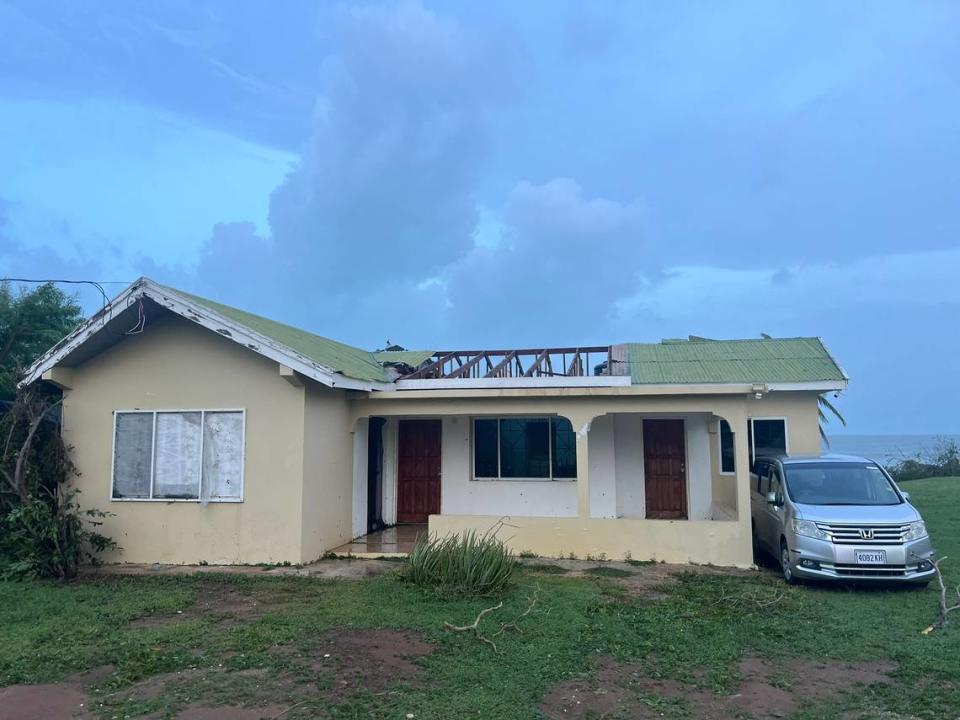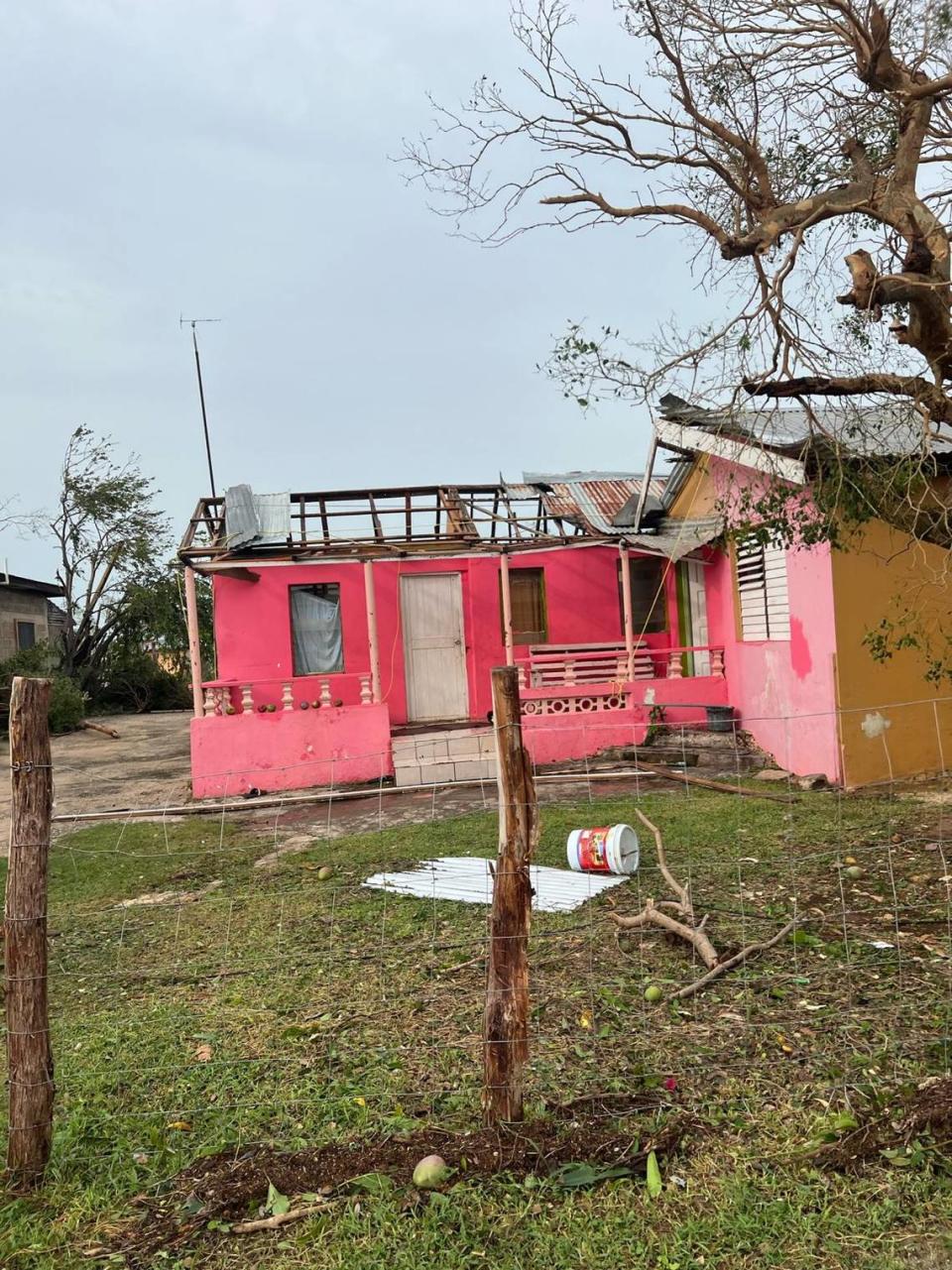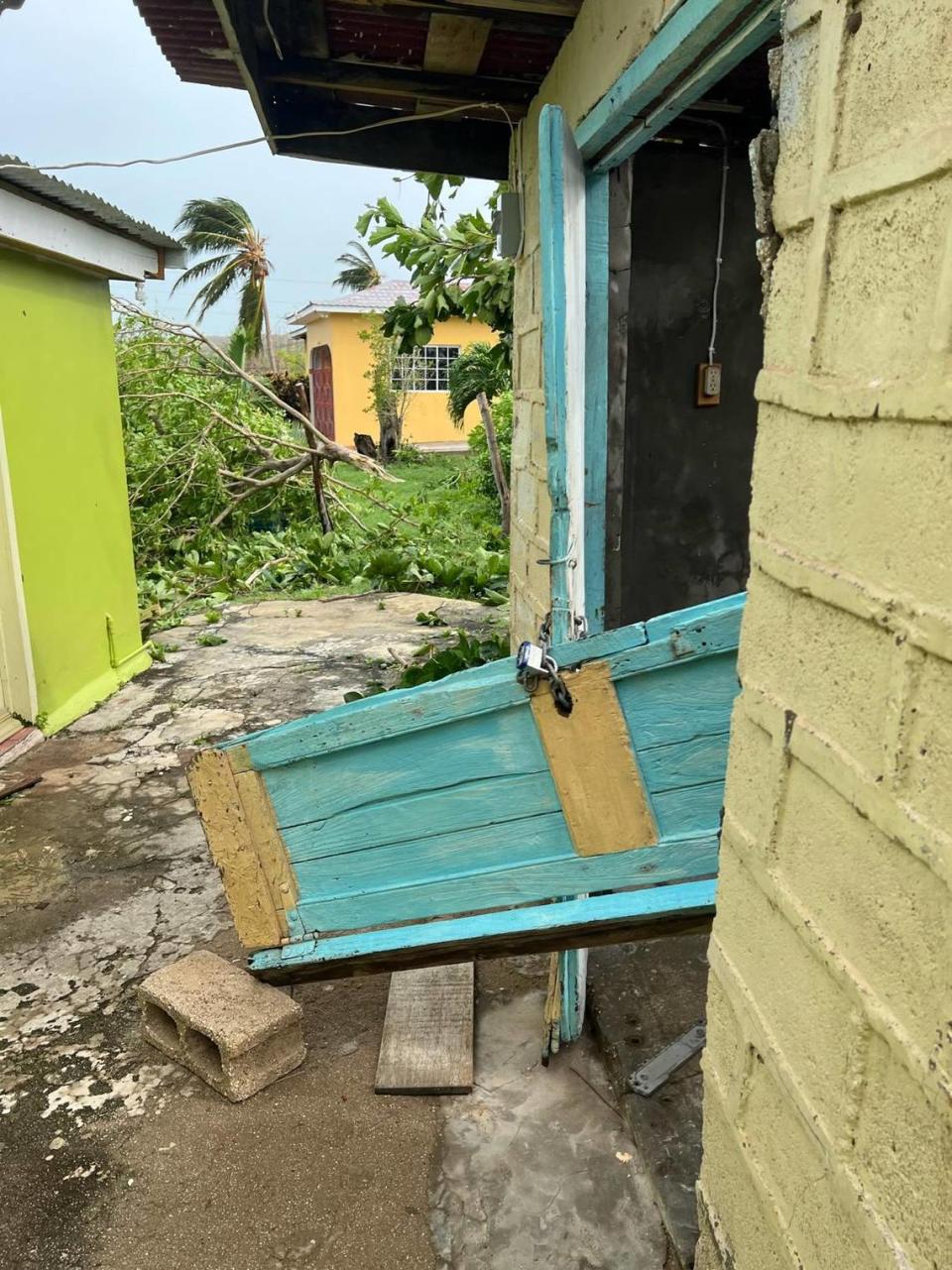‘Words don’t even do justice.’: Beryl rends roofs in a tight-knit Jamaican community
In Treasure Beach, a small fishing and agricultural community on the coast of southern Jamaica, Hurricane Beryl started off slow. There was some breeze, and a little bit of rain.
“And then it was from zero to a hundred real quick,” said Adrian Brown, a 27-year-old bartender who grew up nearby and has lived in Treasure Beach for several years.
The winds picked up and became rougher as the storm roared overhead, tearing roofs off the homes and destroying crops. On Thursday, after Category 4 Beryl was gone, Brown rode a motorcycle to scout the damage.
Downed power lines were everywhere, making him wonder about when power would return. The streets were riddled with rippled pieces of zinc metal, a common roofing material in the Caribbean.
“There’s zinc everywhere from people’s houses,” he said, “Words don’t even do justice.”
READ MORE: One death and plenty of damage in Jamaica. Hurricane Beryl weakens to Category 2

This is just the best community in the world,” said Rebecca Wiersma, an American tour and villa operator who has lived there since 1993. “Everybody is helping each other out. Everyone just greets each other with a hug and says ‘Are you ok?’”
She told the Miami Herald about a man clearing debris on blocked streets with his backhoe since the morning; families taking in displaced neighbors who had lost their homes; villa owners sheltering staff and friends in their holiday houses.
The damage is worse than after Category 4 Hurricane Ivan 20 years ago, she said, referring to the 2004 cyclone ravaged Jamaica, killed 17 people on the island and caused hundreds of millions of dollars in damages.
“Everything is devastated. It’s absolutely devastated,” she said, “I’ve lived here for 31 years and never seen it so bad.”
Despite the grim panorama, Wiersma said that if anyone could get through this devastation, it was the residents of Treasure Beach. Above all, the community was grateful that everybody had survived the storm.
“We are just all feeling very grateful that nobody was hurt or killed. That’s the first thing we all start with. Saying ‘Praise God for life.’,” she said.
An initial assessment showed that roughly one-third of homes had ruined or torn-off roofs, said residents. But they emphasized that those numbers are preliminary, and they were just beginning to understand the hurricane’s aftermath.

Elsewhere in Jamaica, there was one official death and one man missing in the storm’s floodwaters. Damages were widespread across the island but not crippling.
Part of the roof of the Norman Manley International Airport was ripped off by Beryl’s Category 4 winds, but the airport is set to re-open early Friday morning. There were some extensive power outages and damaged buildings near Kingston, but government functions were set to largely return to normal by Friday.
The worst of the damage, however, was along the southern coast of Jamaica, where the northern eyewall of the Category 4 storm brushed on Wednesday.
Treasure Beach has historically been the home of fishermen and farmers. Houses and businesses are nestled around four pristine bays on the Caribbean Sea. In recent decades, Jamaicans have set up small hotels, villas, and cottages and local residents have pivoted to working in tourism. The grandparents of Justine Henzell built a seaside cottage there in 1941, before electricity and tap water came to the area. Fifty years later, her mother Sally built the Jakes hotel, just down the road from where she’d grown up.
But despite it’s small full-time population of between two and three thousand, Treasure Beach’s influence is outsized and mighty. It’s home to the Calabash International Literary Festival, the largest of its kind in the English-speaking Caribbean. It also hosts the longest continuing triathlon in the world.
“It’s very special because it’s quite small and kind of off-the beaten track,” said Henzell, one of the co-founders of the festival, of the region.
There are no big-chain hotels or all-inclusive resorts, residents said. The guest accommodations host yoga retreats, farm dinners, and other activities, attracting both domestic and international travelers. They doubled as shelter for staff, neighbors, and friends during Beryl.

Brown temporarily relocated with his wife Carly at the Rainbow Tree, a small, eight-room vacation rental a friend owns, to weather the hurricane. They watched the waves dance in the fury of Beryl. Their 9-month-old baby girl slept through the storm.
But in the morning, the roof of the home they rented was gone. Many of their belongings were soaked.
“It’s just kind of hard to complain. There’s so many people who are in the same situation...or worse,” said Brown, the coos of his child echoing in the background.
Jonathan Peacock, a 62-year-old lawyer from Bristol first came to Treasure Beach with his wife and four-year-old daughter about 20 years ago, shortly after Hurricane Ivan. The British family witnessed how residents rallied for each other.
“We saw that how everyone pitched in and made everything function once more,” he said, “Everyone will pull together again and do what they have to do to get things running again.”
Peacock fell in love with Treasure Beach’s collective spirit. He kept coming back and made friends. It’s where he wed his wife in 2008.
The married couple eventually bought a small villa called La Sirena, a 5-bedroom home perched over blue ocean. Some seven people stayed in the holiday house during the storm, including staff and their families who wanted to stay together. Peacock said they and their family who had been affected by Beryl could continue sheltering there.
It’s the unsung heroes that will help Treasure Beach recover, said Peacock, like Miss Ida, a former keeper of their inn who has cared for some of the community’s children.
“They do incredible grassroots work day-to-day because that’s who they are. And that’s who is going to pull Treasure Beach through,” he said.
Henzell, the literary festival founder whose family has lived in the area for decades, stressed that residents would be in need of construction supplies and funds to rebuild. Many don’t have property insurance. Jamaican Prime Minister Andrew Holness was visiting the area on Thursday.
“It’s a community that really works together. And I know that we will rebuild quickly. But we need a lot of assistance now,” she said.
Those interested in donating help Treasure Beach residents rebuild and recover can send money to American Friends of Jamaica, and specify that they want donations to be destined there.
READ MORE: Hurricane Beryl has devastated the Caribbean. Here’s how you can help from Miami

